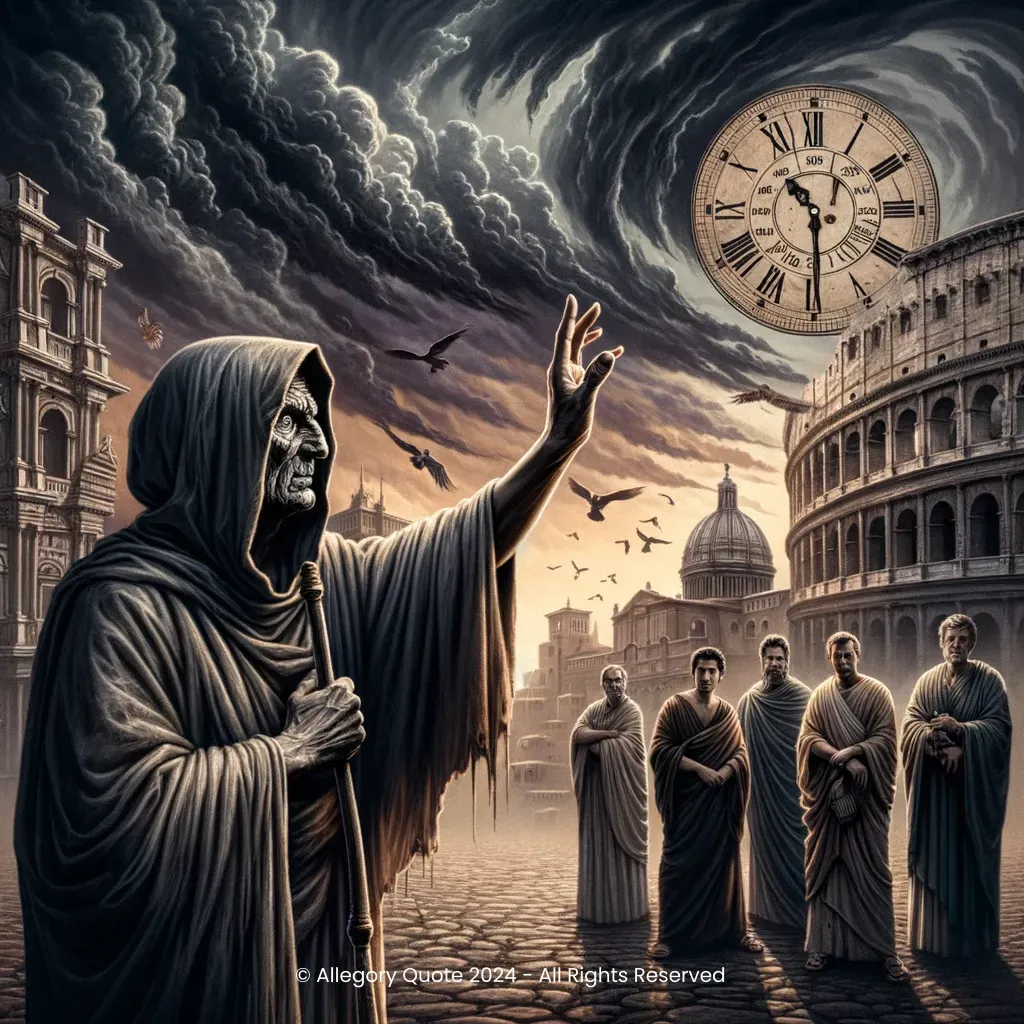Beware the Ides of March

0
0
0
0
- Meaning
- The phrase “Beware the Ides of March” is a forewarning of imminent danger or misfortune. The Ides of March, which falls on March 15th, was historically a day in the Roman calendar. In the context of Shakespeare’s play, it represents the date of Julius Caesar's assassination, marking a moment of great significance and tragedy. Philosophically, it conveys the inevitability of fate and the often-ignored warnings that could have changed the course of history.
- Allegory
- The image elements include the ancient Roman cityscape to set the historical context, dark clouds to symbolize impending doom, and the soothsayer as a key figure representing wisdom and forewarning. Julius Caesar’s confident stride represents his ignorance of the danger, and the sundial showing March 15th symbolizes the specific forewarned date. The conspiring senators with shadowy looks emphasize the betrayal that awaits, creating a visual narrative of tension and foreshadowed tragedy. The contrast in the image highlights the missed warnings and the eventual consequences, evoking a powerful reflection on vigilance and heed.
- Applicability
- This phrase can be applied in modern contexts as a metaphor for heeding warnings and being cautious about potential threats or significant upcoming events. It serves as a reminder to stay vigilant, prepare for possible dangers, and consider the implications of ignoring warnings.
- Impact
- This phrase has had a significant cultural impact, being used in literature, movies, and popular culture as a symbol of foreseen danger and betrayal. It has inspired countless references and discussions about fate, history, and the role of warnings in preventing tragedies. Notably, it’s often cited in discussions about historical events that might have been avoided with proper heed to warnings.
- Historical Context
- The phrase originates from the year 1599 when "Julius Caesar" was first performed, but it refers to events on March 15, 44 B.C., within the historical context of Ancient Rome.
- Criticisms
- While widely accepted as a cautionary phrase, some argue that overuse in various contexts has diluted its original potency. Additionally, distinguishing between genuine warnings and mere paranoia might challenge some interpretations.
- Variations
- In various cultures, there are different versions of cautionary tales and proverbial warnings. For instance, in Japan, they might allude to the proverb “Nanakorobi yaoki,” which translates to “Fall seven times, stand up eight,” stressing resilience and vigilance. Each culture has its own ways of interpreting the importance of heeding warnings and being cautious.
-

The golden age is before us, not behind us.
-

The course of true love never did run smooth.
-

Out, out brief candle!
-

What is past is prologue.
-

Cowards die many times before their deaths; the valiant never taste of death but once.
-

A little more than kin, and less than kind.
-

Friends, Romans, countrymen, lend me your ears.
-

All that glisters is not gold.
-

O brave new world, that has such people in't!
-

Good night, good night! Parting is such sweet sorrow, that I shall say good night till it be morrow.
No Comments